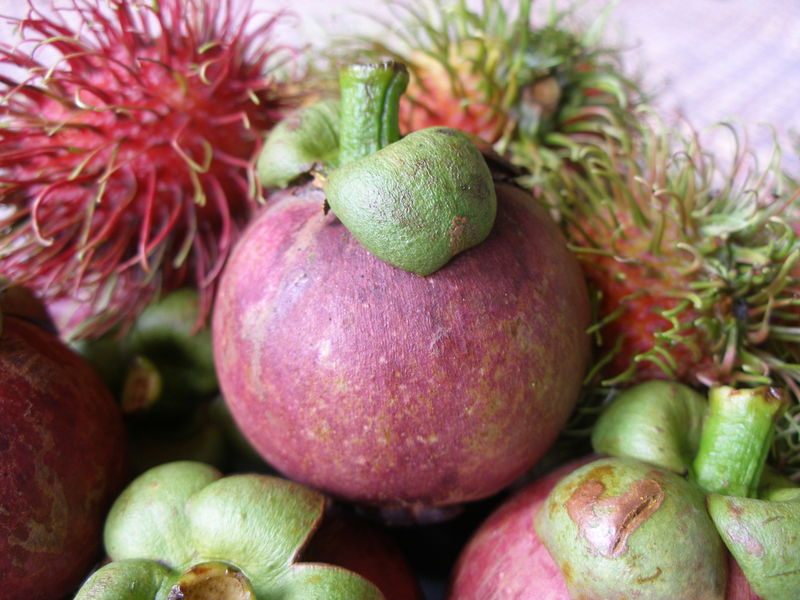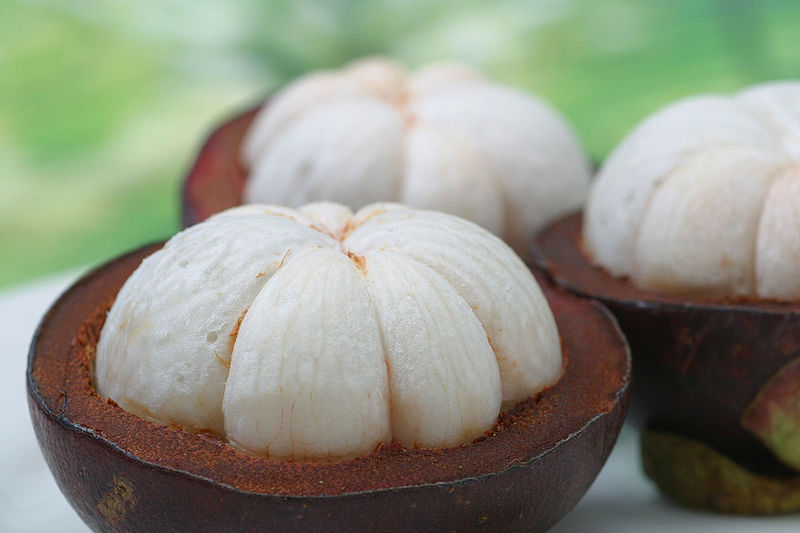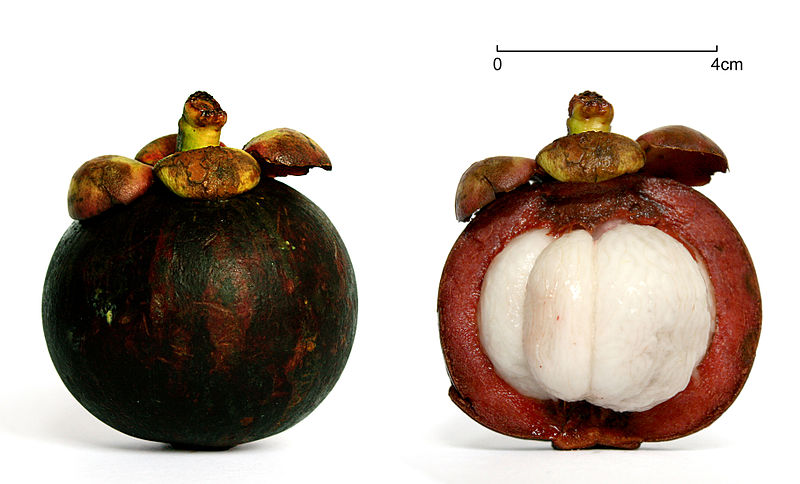現在位置 : 其他 > 山竹果汁 - Mangosteen Juice
|
山竹果
山竹 (學名:Garcinia mangostana),又名莽吉柿、山竺、山竹子、倒捻子、鳳果,熱帶常綠喬木,為金絲桃科藤黃屬下的一個種。原產於馬來群島中的巽他群島和摩鹿加群島,由於盛產於南洋熱帶地區,有「熱帶果後」之稱。在馬來西亞、新加坡和泰國,榴槤和山竹被視為「夫妻果」,故此相對於稱為「果王」的榴槤而言,山竹就是「果後」。山竹同屬的主要水果包括鈕扣山竹(Garcinia prainiana)和檸檬山竹(Garcinia madruno),近緣種是福木(Garcinia subelliptica)。 山竹樹可長到7-25米高,樹冠為圓形或圓錐形,樹皮為黑褐色,樹皮汁液為黃色,至少需要5-6年才可結果,而大多數則需要8-10年。樹葉對生,長8-15厘米,為常綠厚葉,光澤皮革質感。花直徑2.5-5厘米,雄花或兩性花,兩性花生於嫩短枝的前端,1或2個。萼片及花瓣4枚,為肉質黃色雜有紅色和淡粉色。一朵花中雄蕊數量多,雌蕊一個,柱頭4-8裂。 山竹果實成熟後,果實為直徑4-8厘米的球形,表面光滑,肉質萼片及外果皮內層的柱頭殘存,果皮很厚且極為堅硬,需用刀才能切開。其果皮為黑紫色或粉紅色,很厚,味苦,一般不食用;果肉為白色,瓣狀,外觀頗似蒜瓣,可食用,味道濃郁,清涼甜美,口感柔和,有質感。山竹需要生長在4 °C以上的環境中,否則植株無法成活。 果實 山竹進行不完全無配生殖,因此不需要受精即可長出果實。剛長出的果實為嫩綠色,如果在樹下生長的話,果實會完全是白色。在接下來的兩三個月裡,果實體積變大,外果皮顏色逐漸變深,最後變為深綠色。最終整個果實會長到直徑約4-8厘米為止,而且堅硬的外果皮會變得軟些,這是其種子已發育完全。當果實體積停止增大後,葉綠素合成減緩,另一色相開始顯現。最初果實的外果皮色素為綠色,上有紅色條紋,接著整體變為紅色,最後變為暗紫色,此過程持續十多天,標誌著果實完全成熟並可以食用。 山竹的外果皮中包含具有收斂作用的一系列多酚類物質,包括氧雜蒽酮和單寧酸,這些物質可以確保果實在未成熟時不受昆蟲、真菌、植物病毒、細菌和動物的侵害。 內果皮 山竹可食用的內果皮在植物學中被稱為假種皮,為白色,直徑約為4-6厘米,由4-8瓣組成,為楔形,其中包含無融合生殖種子。在外果皮的內層存在一些突起的脊,是柱頭殘留的痕迹,呈輪狀排列,與假種皮的瓣數相符。 種子 山竹的種子長約1厘米,扁平狀,屬於頑拗型種子,因此在發芽之前要保持種子的濕潤。其種子的胚為珠心胚,不需要經過受精。山竹的種子一脫離果實就可以發芽,而在乾燥條件下會迅速死亡。一個山竹果實中有多個種子,而其中只有一個可以萌發。 化學組成 山竹吃起來很甜美,但其散發出的氣味很淡,因為其氣味的化學組分量約是芳香水果氣味的1/400。山竹的清香氣味主要由揮發性成分,包括乙酸己酯、葉醇 (順-3-己烯醇)及α-古巴烯(Copaene)組成。 山竹營養豐富,抗氧化作用強,而且有保健功效,不過食用要適量,因為雖然正在研究中的氧雜蒽酮被指出可能有抗病效果,但過量攝入此物質會增加酸中毒的可能性。氧雜蒽酮的一種——α-倒捻子素有顯著的抗氧化性,已廣泛用於藥品中,但過量服用會對線粒體功能有毒害作用,損害呼吸作用,造成乳酸酸中毒。 功用 山竹富含胡椒粉蛋白質、醣質和脂類。外果皮中的紅色素可用來製黃色染料。 |
|
(網路資訊, 僅供參考)
山竹果介紹: 山竹它具備了特殊的醫療效果,在歷史上,就使用它的果皮來治療皮膚疾病,並且浸泡於水中,做成效果獨特的山竹果茶,具有強化小腸健康的效果,並且可以提升自體免疫功能。 山竹果醫療功效 山竹果對於抗癌、抗菌、抗過敏、抗發炎都有(強烈而顯著的?)效果,醫療上已證明山竹果可促進腸胃道健康、強化免疫系統、中和自由基、預防心臟血管疾病、預防中風,與促進呼吸道系統健康……等等,都有相當大的幫助。 山竹果含有口山酮具有抗氧化的作用,能夠防止細胞遭受自由基的破壞,保持細胞具有最佳的生物狀態、增強動物的免疫力。山竹果中還富含有氧雜蒽酮 (xanthones),氧雜蒽酮也具有抗氧化成份,有助於維持腸道健康、增強免疫機能、抑制自由基,幫助支持軟骨和保養關節機能,能促進強化呼吸系統。 山竹果營養功效 山竹果肉含可溶性固形物16.8%,檸檬酸0.63%,還含有其他維生素B1,B2,C4和礦物質,具有降燥、清涼解熱的作用,因此,山竹不僅味美,而且還有降火的功效,能克榴槤之燥熱。在泰國,人們將榴槤山竹視「夫妻果」。如果吃了過多榴槤上了火,吃上幾個山竹就能緩解。 另外,山竹含有豐富的蛋白質和脂類,對機體有很好的補養作用,對體弱、營養不良、病後都有很好的調養作用。 山竹果適用人群 一般人都可食用。體弱、病後的人更適合,雖然一般人都可食用山竹,但每天吃3個足矣。因含糖分較高,肥胖者宜少吃,糖尿病者更應忌食。它亦含較高鉀質,故腎病及心臟病人應少吃。 山竹果食用宜忌 山竹富含纖維素,在腸胃中會吸水膨脹,過多食用反而會引起便秘。另外,山竹屬寒性水果,所以體質虛寒者少吃尚可,多吃不宜,切勿和西瓜、豆漿、啤酒、白菜、芥菜、苦瓜、冬瓜荷葉湯等寒涼食物同吃,若不慎吃過量,可用紅糖煮薑茶解之。 山竹果是一個營養價值非常高的水果,想了解更多山竹果的好處可以來這邊看看喔。 |
|
Purple Mangosteen
The purple mangosteen (Garcinia mangostana), colloquially known simply as mangosteen, is a tropical evergreen tree believed to have originated in the Sunda Islands and the Moluccas of Indonesia. It grows mainly in Southeast Asia, and it also grows in tropical South American countries such as Colombia and in the state of Kerala in India, where the tree has been introduced. The tree grows from 6 to 25 m (20–82 ft) tall. The fruit of the mangosteen is sweet and tangy, juicy, and somewhat fibrous, with an inedible, deep reddish-purple colored rind (exocarp) when ripe. In each fruit, the fragrant edible flesh that surrounds each seed is botanically endocarp, i.e., the inner layer of the ovary. The purple mangosteen belongs to the same genus as the other, less widely known, mangosteens, such as the button mangosteen (G. prainiana) or the charichuelo (G. madruno). |
|
Is $40 ‘super fruit’ juice really good for you?
Business claims drink offers immunity boost — but hasn’t proven it. (Xanco 果汁業者稱此飲料能提升人體免疫力,但尚未證明。) Associated Press updated 2/11/2008 12:38:51 PM ET SALT LAKE CITY — On stage at a sales convention, XanGo executive vice president Joseph Morton said that when he first stumbled across mangosteen, a tropical fruit with purported curative powers, "I didn't have to have it confirmed in the New England medical journal before I would listen." The multilevel marketing company has built a huge business around its mangosteen-based juice, which it promotes as an immunity booster. The company still hasn't proved its health benefits — which it says could include a stronger immune system and improved joint function — to skeptical experts. XanGo's Web site includes a disclaimer, noting the juice is not meant to treat or prevent disease. A lab test arranged by The Associated Press found its antioxidant power to be on par with other fruit juices. Morton, a 37-year-old triathlete nicknamed Ironman Joe, was on a business trip in Malaysia when he saw mangosteen, a white delicacy wrapped in a blood-red leathery shell, on the dessert menu. From that introduction, Morton and his business partners capitalized on a new brand category of liquid "super-fruits" that is "doing gangbusters," said Jeff Hilton, a partner at Integrated Marketing Group, a branding and packaging consultant. XanGo has more than two dozen competitors that sell fruit juices, powdered drinks and vitamin fizz tablets. Tahitian Noni International Inc. sold $2 billion worth of noni juice, from the French Polynesia fruit, in its first 10 years by 2006. MonaVie, also of Utah, bottles a blend of acai juice from the Amazon basin berry. Pure Fruit Technologies Inc. underprices XanGo on a mangosteen-based juice that sells in health food stores. XanGo, a private company that doesn't reveal financial statements, said at the October convention that since its launch five years ago, sales of the mangosteen-based juice topped a cumulative $1 billion. It ships out bottles by the case from Spanish Fork, Utah, and says it has 700,000 unsalaried sales associates in 17 countries. "That's the only product they sell, and people are taking it around the world," said Sen. Orrin Hatch, R-Utah, who quaffs the purplish-color XanGo and pops multivitamins and other supplements every day. Hatch was the prime sponsor of the 1994 Dietary Supplement Health and Education Act, which allows the sale of supplements unless the Food and Drug Administration can prove them harmful. An independent lab test performed for The Associated Press shows XanGo's antioxidant strength is no better than other readily available fruit juices, yet it costs nearly $40 a bottle. XanGo insists mangosteen contains other beneficial chemicals. "My big concern with XanGo is that the business has gone a long way without showing any benefit in human trials," said Wayne Askew, director of the Division of Nutrition of the University of Utah's College of Health. Others are skeptical, too. "It's a 'Wizard of Oz' story," said Anthony Almada, president and chief executive of GENr8 Inc., a marketer of sports nutrition dietary supplements. "The industry is built on storytelling, and because they do it one-on-one, without advertising, they don't incur the wrath of the FDA." Dietary supplements are a $22 billion largely unregulated business in the U.S. For the lab test, The Associated Press shipped a 750-milliliter bottle of XanGo to Oregon State University's Linus Pauling Institute at Corvallis. The institute measured its antioxidant strength against store-bought juices that sell for a few dollars a bottle. On a scale of molecular weight, XanGo's antioxidants measured 14,884 "micromoles" per liter — slightly higher than cranberry juice, but lower than black cherry and less than half the power of blueberry juice. Apple juice finished last in this test. "In terms of its antioxidant capacity, XanGo is in the middle of the pack," said Balz Frei, the institute's director and chairman. Antioxidants are substances added to many foods and even soap in the belief they can slow down the damage oxidation can do to cells. Frei and other scientists emphasize that antioxidants haven't been shown to actually work inside the human body. Antioxidants are known to work in test tubes, but stomach acids could neutralize them before they can get to work destroying any cell-damaging free-oxygen radicals. Uncertainties over testing protocols have stalled research, yet every day seems to bring another mangosteen bottler, as an Internet search will show. XanGo's research and development manager insists mangosteen has more to offer than its so-called oxygen radical absorption capacity — a rich cocktail of other beneficial chemicals barely known to science. "You have a fruit that's very complicated, with a lot of chemicals in it," said Mike Pugh, who dismissed antioxidant ratings as a "numbers game" He said the type of antioxidants can be more important. Pugh believes all the scientific debate can be pointless: If mangosteen makes people feel better, he said, it must do some good. "It helps with my severe allergies," said Tim Gardner of Hammond, Wis., a 27-year-old district manager for a chain of auto parts stories who drove nonstop with his wife and two other couples to Salt Lake City for the XanGo convention. Gardner said he became a sales recruit to lower his cost to $25 wholesale from $37.50 for a three-quarters of a liter bottle. "You're not trying to sell the product; you're sponsoring other people," Gardner said. "Every distributor is a customer, and every customer is a distributor." Jon Taylor, a one-time Nu Skin Enterprises Inc. distributor and trial consultant for disaffected distributors who analyzed XanGo's multitiered compensation plan at the AP's request, said it was little different from scores of other multilevel marketing ventures. It's a formula, he said, that makes money for the top 1 percent of distributors and leaves many other recruits stockpiling products they can't sell. "The reason you lose money is you have to buy products every month to stay good with the company," Taylor said. "That's the rub." Bob Freeze, XanGo's vice president for public relations, dismissed Taylor as a "disgruntled" former Nu Skin recruit "who has taken up a fight to bring down any legitimate multilevel marketing company." Provo, Utah-based Nu Skin, a $1 billion network marketing company that sells dietary supplements and skin care products, has been fined three times by the Federal Trade Commission for misrepresentations. Successful XanGo distributors take a cut of commissions from others recruited into their chain of sales associates. Denise Villahermosa, 49, who lives in northern Virginia, sits atop an organization of 6,000 distributors — "we all use the product" — that produces more than $100,000 in monthly sales. That makes Villahermosa a top-level "premier" distributor; she gets commissions, bonuses and travel rewards for her efforts. "We sell the XanGo story," Villahermosa said. "I share my story, how I got involved and how the product has worked for me. I wanted to stay healthy." XanGo has been warned by the FDA for claiming that mangosteen could ward off disease or cancer. The company insists those claims were printed by a third party on a brochure at a recruitment seminar and it's not responsible. XanGo executives said they haven't heard from the FDA since receiving a warning letter last summer and assume the case is closed. Paul Teitell, the FDA's assistant district director in Denver, said the matter isn't settled. The agency can seize the product, stop the company from doing business or prosecute, he said. "The fact they haven't heard from us since last summer doesn't mean the case is closed," Teitell responded. "We warned them, and what happens beyond that warning is based on the way they behave, not how we behave." |





